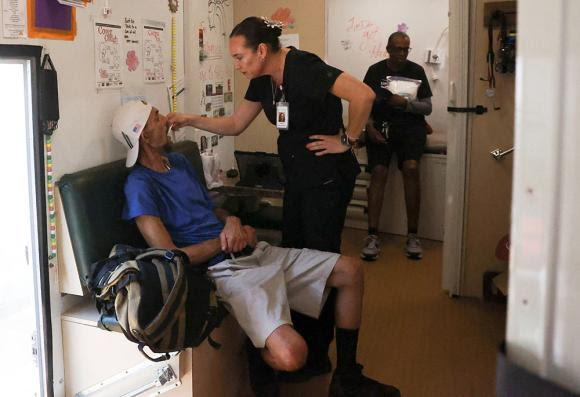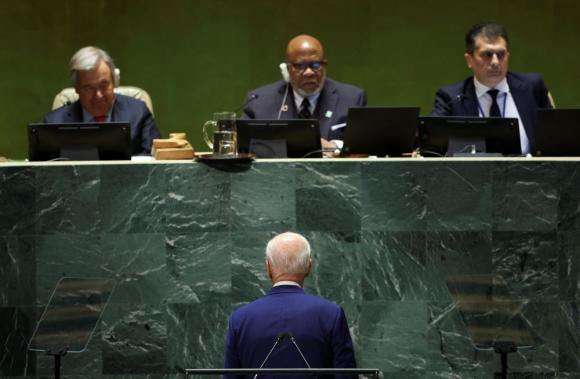| ||||||||||||||||||||||||||
|
In this blog, we'll look at how men and women at serving Jesus Christ both at home and abroad. We'll focus on how God is using their work to transform the lives of people all over the world.
Friday, September 29, 2023
WCC News: WCC and partners celebrate 75th anniversary of adoption of Universal Declaration of Human Rights
EarthBeat Weekly: From a bishop in Tucson to journalists in NYC, climate hope exists
From a bishop in Tucson to journalists in NYC, climate hope existsYour weekly newsletter about faith and climate changeSeptember 29, 2023  Participants with the banner of the Metro New York Catholic Climate Movement march from St. Paul the Apostle Church to the main rallying point for the Sept. 17 climate march in midtown Manhattan. (GSR photo/Chris Herlinger) Last week, I spent two days during Climate Week NYC at "Climate Changes Everything: Creating a Blueprint for Media Transformation," a conference for climate journalists and journalists who want to do a better job of telling the climate story. Held at Columbia University and cosponsored by Covering Climate Now, the Columbia Journalism Review, The Nation, The Guardian and the Solutions Journalism Network, it was an event full of valuable listening and learning. I left at the end of the conference full of ideas and enthusiasm for new projects at EarthBeat, and also with a real sense of pride for the work that we already do. With a small staff within the niche landscape of Catholic media, EarthBeat is publishing reports and commentary on many of the same major climate stories as other larger mainstream media outlets — always while asking why these stories should matter to Catholics or what they have to do with Catholicism. For me, one of the things that approaching climate news from a Catholic angle has always meant — and that was emphasized by last week's conference about climate journalism in general — is being attentive to how care for creation is connected to other topics of conversation or issues of concern. Popular culture calls this intersectionality. Pope Francis calls it integral ecology. No matter its name, it is a critical part of effectively telling the climate story. Sometimes it means including points about the environment within stories that run outside of the dedicated climate beat, such as in this story about the 2023 Farm Bill, published in NCR's news section on Tuesday, that discusses why some Catholic groups want environmental components of the legislation to be prioritized. Other times it means planning content in a way that highlights how it relates to other justice issues, such as NCR environment correspondent Brian Roewe's recent feature story on how climate change is affecting migration in Honduras. That story ran on Earthbeat and NCR's homepages during National Migration Week to make clear this was not just a climate story. Other reports at Earthbeat this week connected to issues of health, economics, finance, politics and activism. There are so many entry points for people to encounter climate news. And because Pope Francis repeatedly and emphatically talks about how intricately everything is interconnected, it feels like the only way to tell a Catholic climate story is to do it in this way. It also helps us reach new readers with stories that matter. If you know someone who might not click on the climate section, but would be interested in one of the other topics listed above, consider sharing the article link with them. They just might be surprised to find how much resonates with their own experience or interests. Thanks for helping us share the Catholic climate story. What else is new on EarthBeat:
 by Stephanie Clary Bishop Edward Weisenburger says climate change "is a practical, local issue of local concern." He spoke to EarthBeat about his recent op-ed on climate change and hope, and his hopes for Pope Francis' "Laudate Deum."
 by Kimberley Heatherington, OSV News The announcement was greeted with "excitement and hope" by Kayla Jacobs, program manager of youth mobilization at Catholic Climate Covenant.
 by Catholic News Service Pope Francis said the title of his new letter on the environment will be "Laudate Deum," (Praise God), a frequent refrain in several psalms.
 by Kimberley Heatherington, OSV News The "Climate Ambition Summit" excluded the U.S. and China because the U.N. invited only leaders from nations with concrete plans to achieve net-zero greenhouse gas emissions.
 by Chris Herlinger With a week of marches, workshops and a U.N. summit behind them, Catholics say they must continue and expand their work to increase public pressure for change on climate action.
 by Brian Roewe As President Biden urged global cooperation at the U.N. to combat climate change, U.S. Catholic groups are calling on his administration to use debt relief to help countries most vulnerable to the impacts of climate change.
 by Marqus Cole, Religion News Service We must take up the opportunity to partner with God in bringing "heaven to earth" through positive actions that restore creation and defend the most vulnerable from climate harms. What's happening in other climate news:Report: The world’s most critical climate target is still within reach — Akielly Hu for The Guardian Why Biden's allies are scrambling to elevate his landmark climate law — Timothy Puko for The Washington Post The Father of Environmental Justice Exposes the Geography of Inequity — Yessenia Funes for Scientific American ‘We Can’t Drink Oil’: How A 70-Year-Old Pipeline Imperils The Great Lakes — Oliver Milman for the Guardian "Indigenous Brazilians Celebrate Land Claims Win - But Fight Goes On" — Andre Cabette Fabio for Thomson Reuters Foundation Times launches Climate California — The LA Times Final Beat:Another takeaway from the "Climate Changes Everything" conference in New York last week was a sense of community hope and optimism. Yes, sometimes working in climate news can be hard, feel defeating and even lead to despair. There's a reason terms like "climate anxiety" and "climate grief" have developed in recent years. And yet, this was a room of people who know the extent of the climate crisis — and also know that we have the solutions we need to protect life on Earth. We just need to share information about them and implement them well. Here's a brief video put together by Covering Climate Now of journalists at the conference sharing their thoughts. Thanks for reading EarthBeat!
Featured AdvertisersAdvertisement |
SojoMail - These Indigenous spiritual practices deepen my faith
 |
Editor’s Note: Understanding what you’re most passionate about helps shape the future of our work! Your input matters to us, so we're inviting you to take our audience survey now. Please complete as much of it as you are able; we read everything you send to us through the survey. Thanks! Tired of Western expressions of Christianity that are ahistorical, deeply individualistic, and private, Sandy Ovalle Martínez writes in this week’s SojoMail that she longs for cosmologies that integrate the pieces within us: Costa Rican-American writer John Manuel Arias often says that he lived in San José, Costa Rica with his grandma and four ghosts. When he shares this fact with Latine folks, he is typically met with curiosity: What are the ghosts’ names? How do they communicate with you? Did they follow you to the U.S.? It is a common understanding in many Latin American Indigenous cultures that the veil between the living and the dead is thin, and relating with our ancestors can be an everyday occurrence. Scriptures that speak of the clouds of witnesses surrounding those who follow Jesus resonate strongly with many Latine folks. We know that those who have endured the race set before them still encourage us today. We think of Jesus on a mountain conviviendo and communing with Moses and Elijah before his three disciples as an experience that can be part of our reality too (Luke 9:30-36). We may not call them ghosts, but we recognize our ancestors are still with us. Many Latines living in this country have adopted a form of white, Western Christianity that has come at a great cost to our cultural identity, our communal connection, and our sense of belonging. We’ve faced the tension of embracing a faith marked by discourses that demonize Indigenous, Afrolatine, and mestizo wisdom and spiritual practices. In trying to live out our new faith values, we wrestle with continuing to trust the goodness of the traditions and saberes in which we were raised. If we have internalized the air of superiority that white, Western Christianity breathes, we are at risk of losing the very wisdom that allowed our people to resist the dagger of colonization. But our bodies, our hearts, and our communities often clamor to remember, and they will not go silent.
|
ADVERTISEMENT |
Our Latest Christians Should Face US History, Not Suppress It (by Ryan Duncan) Recent legislation suppresses knowledge about historic injustices in classrooms, but Christians must stand for truth. This Is What a Faith-Based, Pro-Family Agenda Really Looks Like (by Adam Russell Taylor) I’m tired of hearing politicians using “family values” as shorthand for a narrow and often misguided agenda. Rich Mullins Played Evangelical Court Jester (by Mitchell Atencio) The writer of “Awesome God” challenged the assumptions of his CCM audiences and industry with ‘wisdom, humor, and love.’ Faith Activists Urge Congress to Resurrect the Child Tax Credit (by Bekah McNeel) After Congress failed to renew “the most important anti-poverty program” in half a century, child poverty more than doubled. |
ADVERTISEMENT |
From the Magazine ‘It Came Back to Haunt Them’ (by Gabriel Pietrorazio) The Seneca Nation works to heal the wounds inflicted by a Presbyterian-run residential school. |
ADVERTISEMENTS |
New Sojourners magazine offer for students If you are a student looking for a way to put your faith into action for justice, look no further than our new offer of six free issues of Sojourners magazine. Don’t miss this opportunity to get six issues of Sojourners magazine with no obligation! Go to our website to learn more. Announcing the Flourishing Futures Campaign This month, SojoAction launched Flourishing Futures: a campaign to equip faith-rooted early-childhood development champions and allies everywhere to protect and promote the health of children and their primary caregivers. Join Churches, congregations, and leaders like you to meet this moment with courage and faithfulness so every child can thrive. |
|
Copyright © 2023 Sojourners, All rights reserved. Sojourners | 408 C St. NE | Washington, DC 20002 Email: sojourners@sojo.net | Tel.: 202.328.8842 |
Thursday, September 28, 2023
WCC news: WCC general secretary to Christian Conference of Asia: “we express and exercise creation care”
| ||||||||||||||||||||||||||
|
Presbyterian Advocacy Hour: Courage in the Face of Authoritarianism
Join us for our first Presbyterian Advocacy Hour of 2026! Courage in the Face of Authoritarianism: Historical Roots and Modern Responses Fe...

-
Genocide, Worker Rights, and White Christian Nationalism NCC Newsletter July 2, 2021 Click here to donate Recent Interview with Jim Winkl...
-
As we enter this sacred season — a time when many traditions gather to celebrate light in the darkness, rest after a long year, and the endu...
-
View this email in your browser Welcome to the Truth and Action Roundup, a reliable weekly source of information, inspiration, and action f...



 Stephanie Clary
Stephanie Clary

